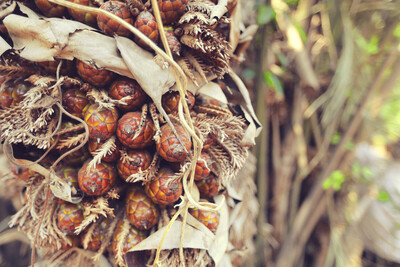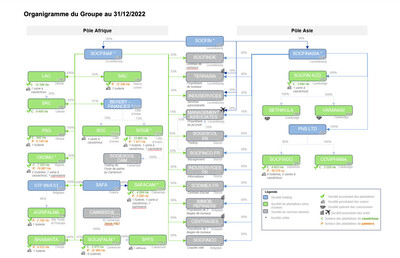 In Cameroon, problems are multiplying for the Socfin group, a Luxembourg-based vehicle for investing in rubber and palm oil plantations in Africa and Asia. As a result, the Norwegian Government Pension Fund Global’s ethics committee has recommended excluding one of Socfin’s main shareholders, the Bolloré group. Photo: Shutterstock
In Cameroon, problems are multiplying for the Socfin group, a Luxembourg-based vehicle for investing in rubber and palm oil plantations in Africa and Asia. As a result, the Norwegian Government Pension Fund Global’s ethics committee has recommended excluding one of Socfin’s main shareholders, the Bolloré group. Photo: ShutterstockDelano | 29 August 2024
Regulation
Socfin to withdraw from Luxembourg Stock Exchange: the end of an era
Written by Thierry Labro
The CSSF has put an end to a year-long dispute between small shareholders and Socfin's main shareholders, the Fabri family and French billionaire Vincent Bolloré: the 689,337 shares they not control between them will be bought back at €32.50 per share. This will take Socfin off the stock market at a time when it is the target of fierce criticism from a major Norwegian pension fund. It was also the end of an era for the Luxembourg Stock Exchange.
Alleged violations of labour rights, some of them serious. Rape. Sexual violence and harassment of women by plantation supervisors and security guards. Socapalm's workforce is mainly made up of contract or day labourers. No employment contracts are reportedly given. Wages paid are allegedly lower than the legal minimum wage. Reduced for social benefits of which employees will never see a penny. Hiring and dismissal at will. Insanitary housing. In Cameroon, as in Sierra Leone and Liberia, the catalogue of erratic behaviour in certain Socfin subsidiaries leaves little room for doubt, according to the report by the Ethics Committee of the Norwegian Government Pension Fund Global, published recently after 15 years of various denunciations.
This committee, which the investment world watches closely, recommended at the end of June that that “the companies Compagnie de l’Odet SE and Bolloré SE be excluded from investment by the Norwegian Government Pension Fund Global due to the risk that the companies are contributing to serious and systematic human rights abuses. The recommendation relates primarily to working conditions at oil palm plantations in Cameroon and their consequences for local communities.”
In response to the persistent allegations, Socfin joined Earthworm. The international not-for-profit foundation--which works with companies, governments and communities to promote sustainable practices in supply chains, particularly in agriculture, forestry and other industries that have an impact on the environment--investigated the matter at the end of last year before publishing its own, very different report in May. The foundation fully recognised only the extension of exploitation outside the concession, remaining much more nuanced on all the other grievances. The Bolloré group, for its part, has distanced itself by explaining that it had no direct operational responsibility.
Socfin to withdraw from Luxembourg Stock Exchange: the end of an era
Written by Thierry Labro
The CSSF has put an end to a year-long dispute between small shareholders and Socfin's main shareholders, the Fabri family and French billionaire Vincent Bolloré: the 689,337 shares they not control between them will be bought back at €32.50 per share. This will take Socfin off the stock market at a time when it is the target of fierce criticism from a major Norwegian pension fund. It was also the end of an era for the Luxembourg Stock Exchange.
Alleged violations of labour rights, some of them serious. Rape. Sexual violence and harassment of women by plantation supervisors and security guards. Socapalm's workforce is mainly made up of contract or day labourers. No employment contracts are reportedly given. Wages paid are allegedly lower than the legal minimum wage. Reduced for social benefits of which employees will never see a penny. Hiring and dismissal at will. Insanitary housing. In Cameroon, as in Sierra Leone and Liberia, the catalogue of erratic behaviour in certain Socfin subsidiaries leaves little room for doubt, according to the report by the Ethics Committee of the Norwegian Government Pension Fund Global, published recently after 15 years of various denunciations.
This committee, which the investment world watches closely, recommended at the end of June that that “the companies Compagnie de l’Odet SE and Bolloré SE be excluded from investment by the Norwegian Government Pension Fund Global due to the risk that the companies are contributing to serious and systematic human rights abuses. The recommendation relates primarily to working conditions at oil palm plantations in Cameroon and their consequences for local communities.”
In response to the persistent allegations, Socfin joined Earthworm. The international not-for-profit foundation--which works with companies, governments and communities to promote sustainable practices in supply chains, particularly in agriculture, forestry and other industries that have an impact on the environment--investigated the matter at the end of last year before publishing its own, very different report in May. The foundation fully recognised only the extension of exploitation outside the concession, remaining much more nuanced on all the other grievances. The Bolloré group, for its part, has distanced itself by explaining that it had no direct operational responsibility.
Investor responsibility
According to numerous media reports, this communication war has led the Bolloré group to review its holdings as part of its ESG policy and its forthcoming European obligations. And in particular, they say, to insist that Socfin buy back the floating 5% so that the companies in the French group can sell them in full to the Fabri group, the main shareholder and friend of Vincent Bolloré for thirty years. The analysis is a little ‘light’, since not only have the two shareholders been linked for years, but the French group will retain almost 40% of the shares, whether the stock is listed or not, and it is difficult to claim that it has no responsibility, even at the end of the value chain. Moreover, the Norwegian pension fund has given the Bolloré group two years to put its African plantations in order.
A year of discussions around this five percent stake came to an end last week. The Luxembourg Financial Sector Supervisory Commission (CSSF) announced that it had set the share price at €32.50, compared with €30.85, following two very interesting and rare reports on how to calculate the 'fair price' of the firm’s shares. [Read the first by BHB & Partners here and the Accuracy report commissioned by the CSSF here, both in French.] The matter had been referred to the financial regulator by some of the smaller shareholders, who hold a total of 689,337 shares outside the stakes controlled by the two main shareholders via different structures, the Fabri family (55.38% of the capital and voting rights) and the Bolloré group (39.75%). One of the small shareholders told L'Informé: “Socfin is being delisted at a time when its dividends are set to soar, because it has repaid its debts and invested nearly a billion euros over ten years.”
"When the delisting was announced, Socfin had a free float of less than 5%. This no longer justified the listing, given that its two subsidiaries offer an almost identical investment opportunity, while offering a much larger free float and therefore better liquidity", the Luxembourg-based Afico, in charge of the operation, told Paperjam. This is because two subsidiaries, Sofinaf for Africa and Sofinasia for Asia, which are also traded on the Luxembourg Stock Exchange, will continue to be listed.
In the recent past, weeks sometimes passed without the Socfin share changing hands, a sign of low investor interest, say the two reports. The two subsidiaries do not seem to be attracting much interest either, according to our analysis based on their share prices: Socfinaf, which was flirting with €20 in June 2017, is now only trading at around €10 in fairly limited volumes on average, while Socfinasia, at €24 during the same period, has plateaued at around €15.
Two methods of analysis and a cautious outlook
"According to the specialists we spoke to, this is primarily a financial move, because the shares seem to be undervalued compared with their real value", Florence Kroff, coordinator of the NGO Fian, told the Woxx newspaper last autumn. "Some subsidiaries are negatively valued even though they all seem to be prospering. They appear to be in deficit, but we suspect that accounting games are being played between different subsidiaries to arrive at these results…. This also makes it possible to evade a certain number of transparency obligations."
 Socfin's organisational structure. Photo: extract from the Accuracy report
Socfin's organisational structure. Photo: extract from the Accuracy reportThe two separate reports provide a great deal of information about the group, its structure, its competitors, its prospects and the difficulties that lie ahead. While BHB chose a revenue-based approach and Accuracy an opportunity cost-based approach, reading their reports at least makes it clear that it's not as simple as that. Many factors add to the picture of plantations that have entered a period of maturity, such as fluctuations in the exchange rates of certain currencies, which can be as high as 45%, parasites and other diseases that have rendered or may render certain plantations insufficiently productive, geopolitical or political tensions, or the vagaries of the markets for these products.
The group, with 36 companies in total, is present in eight countries in Central and West Africa and two in Southeast Asia via 14 companies operating 191,000 hectares (68% oil palm and 32% rubber) and has almost 35,000 employees. In 2022, it earned €583m from palm oil and €269m from rubber, with sales of just under one billion euros, more than three-quarters of which were generated in Africa.
Founded in 1959, the company has been listed on the Luxembourg Stock Exchange since 1960. As of 29 May 2023, Socfin had a market capitalisation of around €294.5m (or €20.80 per share as of 29 May 2023). The CSSF's decision boosts this to €460m. The firm’s shares will be withdrawn from public trading at a future date.
Read the original French version of this report here












